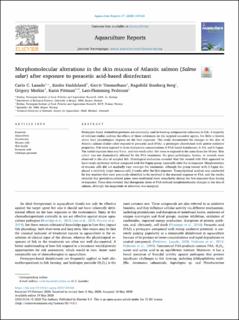| dc.contributor.author | Lazado, Carlo C. | |
| dc.contributor.author | Haddeland, Sindre | |
| dc.contributor.author | Timmerhaus, Gerrit | |
| dc.contributor.author | Berg, Ragnhild Stenberg | |
| dc.contributor.author | Merkin, Grigory | |
| dc.contributor.author | Pittman, Karin | |
| dc.contributor.author | Pedersen, Lars-Flemming | |
| dc.date.accessioned | 2021-03-24T14:30:35Z | |
| dc.date.available | 2021-03-24T14:30:35Z | |
| dc.date.created | 2020-05-17T22:15:33Z | |
| dc.date.issued | 2020 | |
| dc.identifier.issn | 2352-5134 | |
| dc.identifier.uri | https://hdl.handle.net/11250/2735335 | |
| dc.description.abstract | Peroxygen-based chemotherapeutants are commonly used in treating ectoparasitic infections in fish. A majority of relevant studies address the effects of these substances on the targeted causative agents, but little is known about their physiological impacts on the host organism. This study documented the changes in the skin of Atlantic salmon (Salmo salar) exposed to peracetic acid (PAA), a peroxygen disinfectant with potent oxidative properties. Fish were exposed to three therapeutic concentrations of PAA-based disinfectant: 0, 0.6, and 2.4 ppm. The initial exposure time was 5 min, and two weeks after, fish were re-exposed to the same doses for 30 min. Skin colour was not dramatically affected by the PAA treatments. No gross pathologies, lesions, or wounds were observed in the skin of sampled fish. Histological evaluation revealed that fish treated with PAA appeared to have rough epidermal surface compared with the 0 ppm group, especially after the re-exposure. Morphometrics of mucous cells did not markedly vary amongst the treatments, although the group treated with 2.4 ppm displayed a relatively larger mucous cells 2 weeks after the first exposure. Transcriptional analysis was conducted for key markers that were previously identified to be involved in the mucosal response to PAA, and the results revealed that proteolysis-related genes were modulated more remarkably during the first exposure than during re-exposure. These data revealed that therapeutic doses of PAA induced morphomolecular changes in the skin of salmon, although the magnitude of alteration was marginal. | en_US |
| dc.language.iso | eng | en_US |
| dc.publisher | Elsevier | en_US |
| dc.rights | Navngivelse 4.0 Internasjonal | * |
| dc.rights.uri | http://creativecommons.org/licenses/by/4.0/deed.no | * |
| dc.title | Morphomolecular alterations in the skin mucosa of Atlantic salmon (Salmo salar) after exposure to peracetic acid-based disinfectant | en_US |
| dc.type | Journal article | en_US |
| dc.type | Peer reviewed | en_US |
| dc.description.version | publishedVersion | en_US |
| dc.rights.holder | Copyright 2020 The Authors. | en_US |
| dc.source.articlenumber | 100368 | en_US |
| cristin.ispublished | true | |
| cristin.fulltext | original | |
| cristin.qualitycode | 1 | |
| dc.identifier.doi | https://doi.org/10.1016/j.aqrep.2020.100368 | |
| dc.identifier.cristin | 1811401 | |
| dc.source.journal | Aquaculture Reports | en_US |
| dc.source.40 | 17 | |
| dc.relation.project | Fiskeri- og havbruksnæringens forskningsfinansiering: 901472 | en_US |
| dc.identifier.citation | Aquaculture Reports. 2020, 17, 100368. | en_US |
| dc.source.volume | 17 | en_US |

